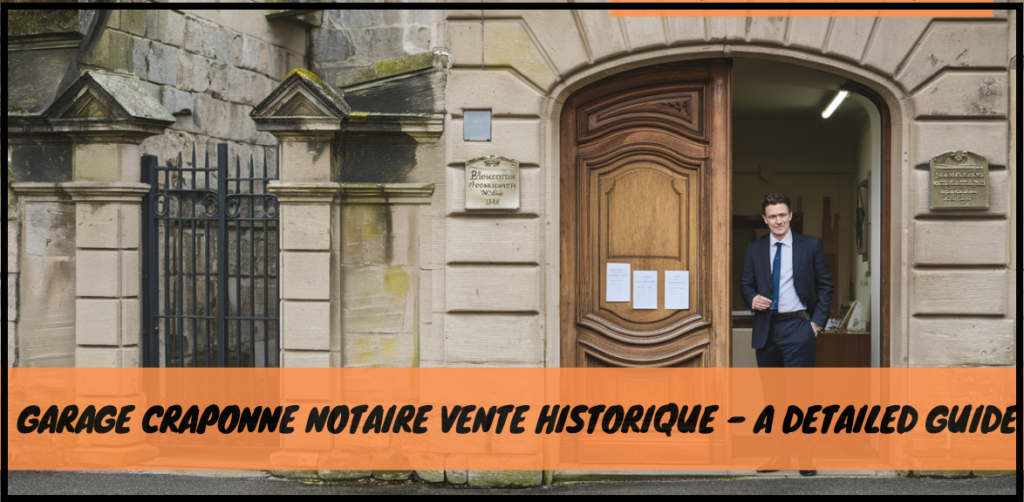- Garage Craponne Notaire Vente Historique: A Comprehensive Overview
- Understanding Craponne’s Historical Significance
- The Role of the Notaire in Property Sales
- Historical Sales Involving Garages
- Legal Framework for Garage Sales in Craponne
- Why Craponne’s Garage Sales Are Historically Significant
- Critical Considerations for Buyers and Sellers in Craponne
- Final Thoughts on Garage Craponne Notaire Vente Historique
- Sources:
Garage Craponne Notaire Vente Historique: A Comprehensive Overview
The history of property sales in France holds many exciting elements, especially in towns like Craponne. With its rich history, including notable property transactions, the city has seen its share of legal real estate sales involving notaries. The term “Garage Craponne Notaire Vente Historique” serves as a focus keyword to understand the town’s past and its legal processes surrounding property sales. Notaries play a vital role in validating and overseeing transactions that involve real estate, often involving garages, homes, and other properties.
This article explores the historical context of Craponne’s property sales, focusing on the role of the notaire (notary) in these legal proceedings and the significance of sales involving garages within the town.
Understanding Craponne’s Historical Significance
Craponne is a small town located in the Rhône department, close to Lyon. With its blend of urban and rural characteristics, the town has grown steadily over the years, expanding its boundaries and properties. The local history is closely tied to property transactions and urban development, making notaries essential figures in this evolution. The involvement of notaries in property sales, particularly in the garage or commercial real estate, marks significant historical developments.
Notaries (notaries) in France are public officers who draft and authenticate legal documents, including property sales. They ensure that all property transfers are done according to legal standards, safeguarding the interests of both parties involved. This becomes especially important in historical contexts, where documentation is crucial for maintaining accurate property records.
The Role of the Notaire in Property Sales
The notary’s responsibility goes far beyond simple document preparation. They are responsible for ensuring that the sale complies with all legal obligations, taxes, and regulations. In Craponne, this role has historically included facilitating sales of various properties, including garages. The sale of a garage, often an overlooked but essential property type, can play a crucial role in urban development and the creation of residential and commercial areas.
Notaries in Craponne have maintained detailed records of property transactions dating back centuries. These records are invaluable for understanding the town’s growth, providing insights into its real estate market, and highlighting how certain types of properties, such as garages, have significantly shaped its infrastructure.
When selling a property, whether a garage or a larger structure, the notaire ensures that all paperwork is filed correctly. This includes verifying the legality of the sale, ensuring that the title is clear, and ensuring that both buyer and seller meet all legal requirements. Without the involvement of a notaire, these transactions would be much riskier, especially in a historical context where property rights were less formally recognized.
Historical Sales Involving Garages
In many instances, the sale of a garage in Craponne has been part of more significant transactions that included homes or commercial properties—garages, although more minor in scale, have played a pivotal role in Craponne’s development. Often seen as utilitarian spaces, they are crucial for both private use and small businesses. For example, a garage attached to a family home or a small business provides essential storage or workspace, enhancing the property’s value.
Historically, notaries have documented the sale of such properties, ensuring that all relevant information, including taxes, zoning laws, and ownership rights, was recorded correctly. The sale of garages in Craponne may not have grabbed headlines like the sale of grand estates. Still, it is significant because these smaller properties contribute to the broader community’s economic and infrastructural development.
The inclusion of garages in property sales and their documentation by notaries is a testament to the importance of maintaining thorough records. Even today, these sales records can be invaluable for historians, urban planners, and real estate developers who seek to understand the historical trajectory of Craponne’s urban expansion.
Legal Framework for Garage Sales in Craponne
Selling a garage in Craponne involves several legal steps, all overseen by a notaire. The process begins with the seller providing proof of ownership and any relevant documents, such as previous sales contracts or property deeds. The notaire then reviews these documents to ensure that the property is free from any legal issues, such as liens or disputes.
Once the legal review is completed, the notaire drafts the sales agreement, which includes the terms of the sale, the agreed-upon price, and any specific conditions (such as the inclusion of certain fixtures or improvements within the garage). Both the buyer and seller must sign this agreement before the notaire, who then registers the transaction with the appropriate government authorities.
Why Craponne’s Garage Sales Are Historically Significant
Garages may seem like mundane structures, but their historical sales in Craponne highlight the broader trends of urbanization, property ownership, and legal reforms in France. In the early 20th century, the rise of the automobile industry spurred the construction and sale of garages as private car ownership became more common. Craponne, like many other French towns, saw an increase in garage construction during this period, driven by the growing need for personal vehicle storage.
As the town grew, garages became more than just places to park cars; they also served as workshops, storage areas, and even small businesses. This diversification in garage use made them valuable real estate assets, and notaries in Craponne were responsible for ensuring that their sales were handled with the same care and legal rigor as any other property transaction.
Critical Considerations for Buyers and Sellers in Craponne
If you’re considering buying or selling a garage in Craponne, there are several factors to keep in mind. Firstly, the legal requirements for property sales in France are stringent, and a notaire must oversee all sales. This ensures that both parties are protected and that the sale is legally binding.
Secondly, the value of garages in Craponne can vary widely depending on their location, size, and condition. A garage located in the town center or attached to a commercial property will likely command a higher price than one situated on the outskirts of town.
Finally, it’s essential to understand the historical context of property sales in Craponne. The town’s real estate market has been shaped by its history, and notaries have played a key role in documenting this evolution. For buyers and sellers alike, working with a knowledgeable notaire can help ensure that the transaction goes smoothly and that all legal obligations are met.
Final Thoughts on Garage Craponne Notaire Vente Historique
Craponne’s real estate history is closely linked to the role of notaries in overseeing property sales, including the sale of garages. These smaller properties, while often overlooked, have played an essential role in the town’s development, both from a residential and commercial perspective. Understanding the legal and historical significance of these sales can provide valuable insights for anyone interested in Craponne’s real estate market.
Questions and Answers:
Q: Why are garages historically significant in Craponne’s real estate market?
A: Garages played a crucial role in the development of the town, particularly during the rise of the automobile industry. They provided necessary space for cars, workshops, and small businesses, contributing to Craponne’s urbanization and economic growth.
Q: How does the role of a notaire impact garage sales in Craponne?
A: Notaires ensure that all property transactions, including garage sales, are legally binding and adequately documented. Their involvement is essential for verifying ownership, drafting contracts, and registering sales with government authorities.
Q: What should buyers and sellers of garages in Craponne keep in mind?
A: Both parties should be aware of the legal requirements involved in property sales, the role of the notaire, and the potential value variations based on the garage’s location, size, and condition.
Sources:
For more information on notaire services and real estate sales in France, check websites like Notaires de France and Agence Immobilière. Additionally, you can explore Craponne’s historical archives for detailed records of property transactions in the town.


